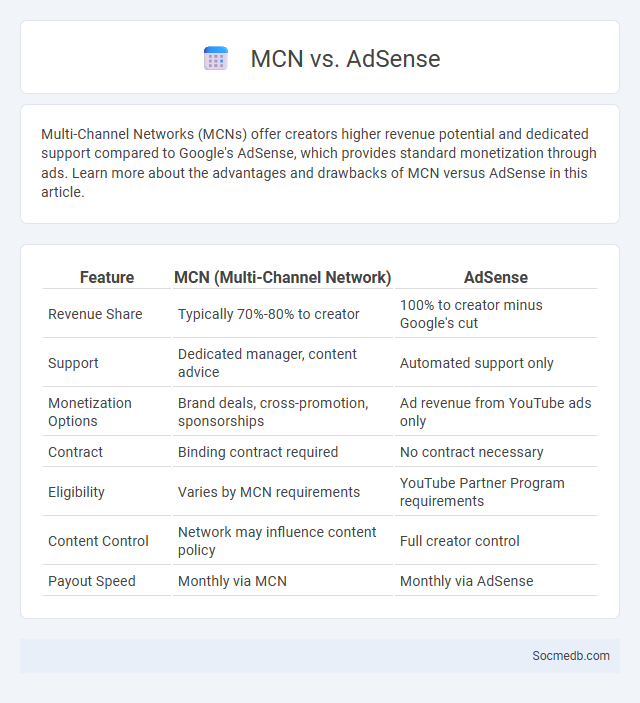
Photo illustration: MCN vs AdSense
Multi-Channel Networks (MCNs) offer creators higher revenue potential and dedicated support compared to Google's AdSense, which provides standard monetization through ads. Learn more about the advantages and drawbacks of MCN versus AdSense in this article.
Table of Comparison
| Feature | MCN (Multi-Channel Network) | AdSense |
|---|---|---|
| Revenue Share | Typically 70%-80% to creator | 100% to creator minus Google's cut |
| Support | Dedicated manager, content advice | Automated support only |
| Monetization Options | Brand deals, cross-promotion, sponsorships | Ad revenue from YouTube ads only |
| Contract | Binding contract required | No contract necessary |
| Eligibility | Varies by MCN requirements | YouTube Partner Program requirements |
| Content Control | Network may influence content policy | Full creator control |
| Payout Speed | Monthly via MCN | Monthly via AdSense |
Introduction to MCN and AdSense
Multi-Channel Networks (MCNs) are organizations that partner with multiple YouTube creators to offer services like audience development, content programming, and monetization support, enhancing channel growth and revenue potential. AdSense is Google's advertising platform enabling creators to earn income by displaying ads on their content, with payments based on viewer engagement and ad impressions. Integrating MCNs with AdSense allows creators to optimize monetization strategies by leveraging network resources alongside targeted ad revenue streams.
What is an MCN (Multi-Channel Network)?
An MCN (Multi-Channel Network) is a company that partners with multiple YouTube channels to provide services such as audience development, content programming, and monetization support. These networks leverage collective bargaining power to negotiate advertising deals and offer resources like analytics, brand collaborations, and production assistance. MCNs help creators optimize their reach and revenue while managing rights and copyright protection across their content.
Overview of Google AdSense for Creators
Google AdSense offers content creators a streamlined platform to monetize their online presence by displaying targeted ads on websites and YouTube channels, generating revenue through clicks and impressions. The program supports various ad formats and provides detailed analytics, enabling creators to optimize their earnings based on audience behavior and engagement metrics. Integration with Google's extensive advertising network ensures high-quality, relevant advertisements that enhance user experience while maximizing monetization potential.
Key Differences: MCN vs AdSense
Multi-Channel Networks (MCNs) provide content creators with strategic support, brand partnerships, and audience growth opportunities, while AdSense primarily offers automated monetization through targeted ads based on your content's traffic. MCNs often negotiate higher revenue shares and offer personalized management, whereas AdSense relies on algorithm-driven ad placement without direct creator interaction. Understanding these key differences helps you choose between hands-on growth support and automated income generation in your social media strategy.
Benefits of Joining an MCN
Joining a Multi-Channel Network (MCN) significantly boosts content creators' growth through access to advanced analytics, monetization opportunities, and brand partnerships. MCNs provide technical support and resources that improve video production quality and audience engagement. Collaborating with an MCN enhances discoverability, enabling creators to expand their reach across multiple social media platforms efficiently.
Advantages of Using AdSense Directly
Using AdSense directly allows publishers to maximize revenue by accessing a broad range of advertisers and real-time bidding, resulting in higher cost-per-click rates. It offers granular control over ad placements, formats, and customization, improving user experience and engagement. Direct integration with Google's platform ensures reliable payment processing and access to detailed performance analytics for continuous optimization.
Revenue Models: MCN vs AdSense
Social media revenue models primarily differ between Multi-Channel Networks (MCNs) and AdSense, with MCNs offering creators tailored brand partnerships, content management, and higher monetization potential through direct sponsorships. AdSense generates income through automated display ads based on user interactions and content relevance, providing a passive revenue stream but often at lower rates compared to MCNs. You should evaluate these models based on your content scale, audience engagement, and preference for hands-on revenue optimization versus automated income.
Control and Ownership: Who Holds the Power?
Social media platforms have centralized control over user data and content, raising critical questions about who truly owns the information shared online. Your digital footprint is often subject to terms and conditions that grant companies extensive rights, limiting your control over personal data and its monetization. Understanding the dynamics of power between users and platform providers is essential for protecting your privacy and asserting ownership in the digital age.
Suitability: Which is Right for You?
Choosing the right social media platform depends on your goals, audience, and content style. Instagram suits visual storytellers and brands targeting younger demographics, while LinkedIn is ideal for professionals seeking networking and industry insights. For real-time updates and trending topics, Twitter offers fast engagement, whereas Facebook provides a broad user base and diverse content options for community building.
Final Comparison: MCN vs AdSense Pros and Cons
MCN offers comprehensive support, personalized content strategies, and higher revenue potential through brand deals, but requires exclusivity and shares a significant portion of your earnings. AdSense provides easy setup, full control over your content, and passive income with minimal restrictions, yet it typically generates lower revenue and lacks tailored promotion. Understanding your content goals and audience engagement is essential to choosing the best monetization method for your social media growth.
 socmedb.com
socmedb.com